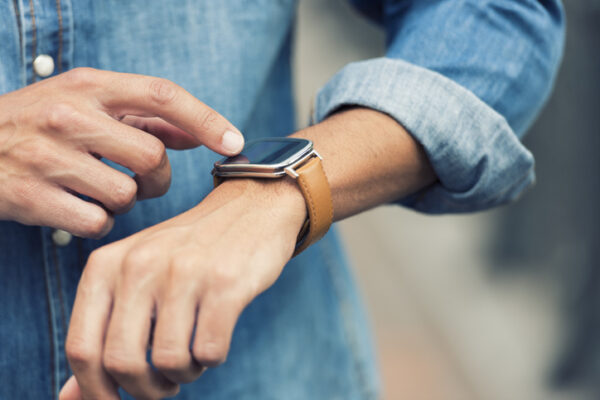
With over 2.5 million Covid-19 cases in the U.S. this July, the pandemic has made it vital for hospitals to diagnose Covid-19 patients early on and monitor their health in real time while limiting contact between patients and medical staff. Wearable technology can play a key role moving forward by helping monitor critical information such as patient heart rate (HR) and core body temperature.
According to ABI Research, 30 million wearable devices capable of tracking, monitoring and fighting the progression of Covid-19 are expected to ship to healthcare organizations and patients this year. The research firm expects this number to grow to 104 million within the next five years based on infectious diseases like Covid-19 and the increasing need to remotely monitor patient’s medical status. Furthermore, as the number of people aged 65 and over continues to grow, physicians will be able to increasingly monitor elderly patients at home.
Many wearables startups are looking at additional uses for their devices and how they can support consumers during the pandemic. Over the last few months, we have seen a growing number of startups with sports tech, wellbeing and fitness backgrounds, pivoting and tweaking their products to help fight the progression of Covid-19. For example, Oura’s smart ring tracks HR, heart rate variability (HRV), and core body temperature. In a research study conducted with UCLA, the company used the physiological data submitted from its users to identify patterns and built an algorithm to predict the onset, progression, and recovery of future Covid-19 cases. Whoop is a Boston-based startup that shifted from wellness and sports to focus on Covid-19 and now showcases how its members are fighting the coronavirus pandemic.
With that in mind, healthcare wearables are becoming a key enabler to help enhance bedside care and clinical mobility experience. For example, the wearables worn by patients in their hospital room, in transit or at home, can now automatically alert healthcare staff members in real time. Staff members can leverage clinical mobility solutions, such as handheld devices or smartwatches with collaboration and messaging solutions, to communicate with each other and take the proper measures to check on a patient in need. This has become increasingly important in the context of Covid-19 as every minute counts to save a patient’s life.
The healthcare industry is also assessing a wide variety of wearable form factors to address Covid-19. Smart rings, patches, stamps, and watches are all capable of measuring a patient’s HR, core body temperature, breathing and other vitals in a hospital and at home. These devices can even monitor coughing which is a key early indicator of Covid-19. One of the more innovative devices is a wireless wearable the size of a postage stamp, that attaches just below a patient’s throat. Created by researchers at Northwestern University, this stamp can monitor coughing and patterns associated with chest wall movements, respiratory sounds, HR, and body temperature.
Another key trend is the emergence of smartwatches embedded with digital assistants that can help users find out if they have Covid-19 symptoms. For example, a smartwatch user can ask, “Alexa, what do I do if I think I have Covid-19?” Alexa will walk users through a series of questions about their symptoms, and then tell them what their risk level is and advise them on what measures they should take.
In the future, we can expect to see more innovations developed as a result of the pandemic to help keep people informed of the status of their own health while aiming to limit surges at medical establishments, improving the efficiency of clinical mobility solutions and bedside care. The potential that wearables have for helping detect early signs of Covid-19 and other infectious diseases, as well as monitoring patients, will make this technology a popular choice for healthcare organizations and consumers for the foreseeable future.
Photo: LDProd, Getty Images
Julien Blin is currently the product manager within the EMC team at Zebra Technologies where he is responsible for building new products for Zebra’s enterprise customers. Julien has more than 10 of experience within the tech industry, especially in areas such as wearables and AR/VR. Previously, he served as Director within the Enterprise Innovation Team at GSV Labs where he helped launch enterprise solutions. He also held similar positions at Google and Samsung. Julien holds a bachelor’s degree in business administration from the Copenhagen Business School (Denmark).
This post appears through the MedCity Influencers program. Anyone can publish their perspective on business and innovation in healthcare on MedCity News through MedCity Influencers. Click here to find out how.










